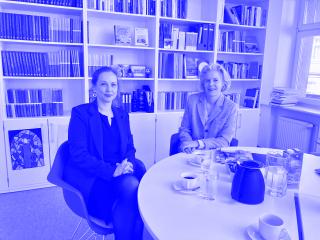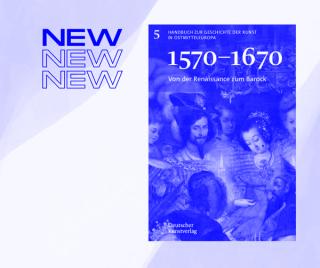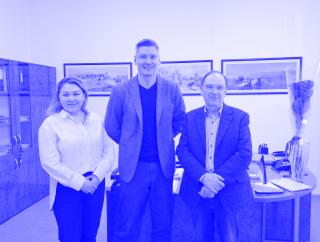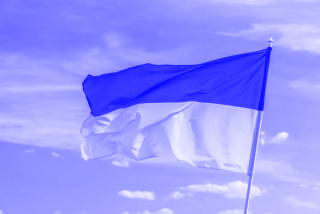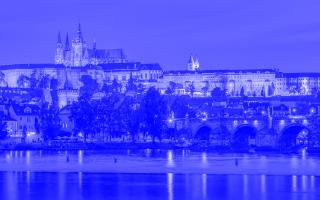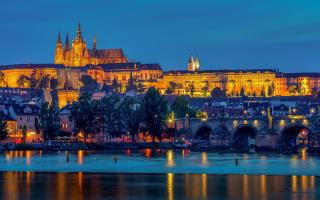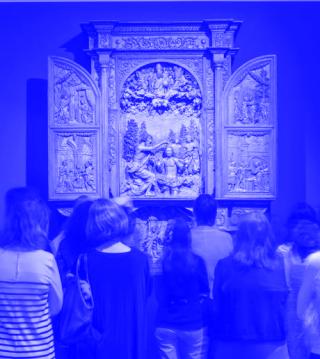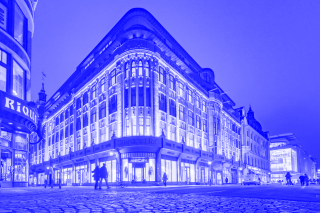
Kelet-Közép-Európai Történet- és Kultúratudományi Intézet (GWZO) – Leibniz Institut Leibniz-Instytut Historii i Kultury Europy Środkowej i Wschodniej (GWZO) Leibniz-inštitút pre históriu a kultúru strednej a východnej Európy (GWZO) Leibniz-ústav pro dějiny i kulturu střední a východní Evropu (GWZO) Institutul-Leibniz pentru studiul istoriei şi culturii în Europa Centrală şi de Est (GWZO) Ляйбніц-Інститут історії та культури Центральної та Східної Європи (ГВЦО) Лейбниц-Институт истории и культуры Центральной и Восточной Европы (ГВЦО) Կենտրոնական և Արևելյան Եվրոպայի պատմության և մշակույթի Լայբնից ինստիտուտ (ԳՎԶՕ)
The GWZO
The Leibniz Institute for the History and Culture of Eastern Europe (GWZO) focuses on the region between the Baltic, the Black Sea and the Adriatic Sea. Its researchers explore this region’s particularities, transformations and relationships in an ever-more globalised world from Late Antiquity to the present day. The collaboration of experts working in different humanities disciplines and coming from different backgrounds is the source of vast and deep knowledge about Eastern Europe. The institute’s staff share their research results with scholars and the public through the publication of scholarly studies and guidebooks, as well as the organisation of exhibitions and events and the preparation of digital knowledge resources. In this way, the GWZO’s activities shed new light on past and current trends in Eastern Europe.
News
Leipzig Declaration
»Leipzig as a scientific centre takes a stance against anti-democracy and right-wing extremism: For academic freedom, human rights and democracy«
The academic institutions in the region of Leipzig, including the Leibniz Institute for the History and Culture of Eastern Europe (GWZO), are taking a firm stand against attacks on our democracy. Respect for the dignity of all people, the free and democratic basic order, plurality, tolerance, international exchange and diversity are prerequisites for our coexistence on campus, for successful research and the best study conditions.
Awarded article
Congratulations: The article »Early mediaeval lead glass bangles from Czerno, Poland: Results of elemental and lead isotopes analyses«, by our GWZO colleague Prof. Dr. Marcin Wołoszyn, among others, was awarded an honour. Published in April 2024 (Vol. 66, Issue 2), it is one of the most frequently cited articles in the renowned journal »Archeometry« in 2024.
The article examines the origin of 30 glass bangles dating from the 12th to 13th centuries. The international team of scientists successfully classified two types of lead glass. Using isotopic analyses, they were able to prove, among other things, that the lead flow for one of the glasses probably originated from the Kraków-Upper Silesia region in southern Poland.

Newly published: Brochure »Leibniz Research Network Central and Eastern Europe Expertise – Collaborations – Knowledge Transfer«
Since 2015, the Leibniz Research Network Eastern Europe has brought together over twenty institutes of the Leibniz Association that focus on or work on projects related to Eastern Europe or with Eastern European partners. This means that the network has the strongest expertise in research related to Central and Eastern Europe within German non-university science.
The network's new brochure has been published and is now available for digital viewing in both English and German. It offers a compact overview of the diverse activities of the institutes connected in the network. The network's spokesperson is GWZO Director Prof. Dr. Maren Röger, and it is coordinated by our GWZO colleague Dr. Magda Wlostowska.
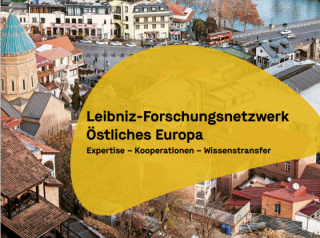
Dissertation successfully defended
Congratulations: On 31 January 2025, our former GWZO colleague Gáspár Salamon successfully defended his doctoral thesis entitled »Stilarchitektur/ Stylearchitecture? Transfer of art historical knowledge in Hungarian architectural theory (1864-1914)« at the Institute for Art and Visual History at Humboldt-Universität zu Berlin (overall grade: summa cum laude). The thesis was supervised by Prof. Dr. Kai Kappel (Chair of History of Architecture and Urbanism). From 2019 to 2023, Gáspár Salamon worked as a research assistant at the GWZO as part of the DFG project »Museal Architectural Villages 1880-1930. Contact Zones of the Own in Transnational Exchange« (project management: Prof. Dr. Cornelia Jöchner and Prof. Dr. Arnold Bartetzky), which is part of the GWZO department »Culture and Imagination«.
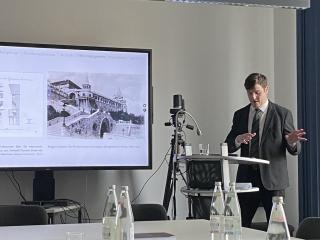
Meeting on strategic further development of cooperation between the University of Leipzig and the GWZO
At the beginning of March 2025, the Director of the GWZO, Prof. Dr. Maren Röger, received the Rector of Leipzig University, Prof. Dr. Eva Inés Obergfell. The meeting focused on the strategic development of cooperation between the GWZO and the university. The university rector and the GWZO director also discussed the current global situation and its impact on the work of both institutions.
The GWZO has been closely linked to University of Leipzig since its foundation, in particular through the joint appointment of GWZO Director and Deputy Director to professorships at the Faculties of History, Art and Regional Studies, Social Sciences and Philosophy. In addition, numerous research and transfer projects are carried out jointly. Several GWZO employees regularly hold lectures at University of Leipzig. The GWZO has had the status of an affiliated institute of the university since 2003.

ERC SynG “EUROpest”: GWZO involved in international consortium
The Leibniz Institute for History and Culture of Eastern Europe (GWZO) is part of a new research project that will be funded by the European Commission and the European Research Council from mid-2025: At the European Research Council (ERC) Synergy Grant »EUROpest«. Under the title »A Novel Understanding of Pandemic Disease in Preindustrial Europe (1300-1800): Combining History, Machine Learning and Natural Sciences«, the project will be launched in the middle of next year. It brings together ten leading research institutions from Europe and the USA – including the GWZO, the Max Planck Institute for Evolutionary Anthropology, JLU Giessen and Georgetown University in Washington. »EUROpest« is dedicated to the question of why one and the same virus, bacterium or pathogen can have completely different biological and social consequences depending on the social and historical context. In an interdisciplinary collaboration, geneticists, climatologists, archaeologists, historians and ecologists will investigate over 50 historical epidemics in Europe – from the plague in the Middle Ages to the introduction of the smallpox vaccine at the beginning of industrialization. The consortium is coordinated by the University of Warsaw under the leadership of Prof. Dr. Adam Izdebski. Further information will be available soon.
30 Years of GWZO: Anniversary Celebrations Look to the Future
The Leibniz Institute for the History and Culture of Eastern Europe (GWZO) celebrated its 30th anniversary on 22 and 23 May 2025. As part of the anniversary conference entitled »On not knowing: Thirty Years of Research on Central and Eastern Europe«, numerous guests from academia, politics and society came together to honour three decades of interdisciplinary, cross-epochal research and international academic exchange. There was also a focus on upcoming projects, including the new Leipzig-based Junior Research Group »Global Armenia/ns. Entangled Histories of Central and Eastern Europe and the Caucasus« and the new GWZO department »Knowledge and Participation«, which will begin its work in Prague in late summer 2025.
A new promotional film, released during the celebrations, provides an overview of the GWZO’s history, key areas of focus and organisational structure.

Now out: Volume 5 of the GWZO Handbook on the History of Art
How does art react to war, destruction and upheaval? Volume 5 of the GWZO Handbook on the History of Art in Central and Eastern Europe, entitled »1570–1670: From the Renaissance to the Baroque«, is dedicated to art created during the transition from the Renaissance to the Baroque in the region. This period was characterised by numerous conflicts and migratory movements, leading to intensive artistic exchange. The volume explores a multifaceted artistic landscape resulting from these processes.
This comprehensive work was edited by Agnieszka Gąsior, Director of the Silesian Museum in Görlitz and a former GWZO member of staff, and Marius Winzeler, Director of the Green Vault and the Armoury at the Dresden State Art Collections (SKD). Published by the Deutscher Kunstverlag, the book is available for purchase here: https://www.deutscherkunstverlag.de/de/books/9783422069626?backButtonTitle=series
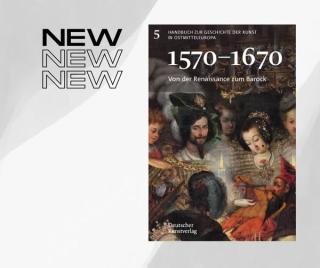
Online exhibition »Destroyed Ukrainian Heritage«
Since the beginning of the Russian war of aggression against Ukraine, Ukraine's cultural heritage has also suffered immense losses. Kyiv architectural historian Dr. Semen Shyrochyn, in collaboration with the GWZO, has curated the English-language online exhibition »Destroyed Ukrainian Heritage. Ukraine's Built Heritage since February 24, 2022. A Record of Destruction«. It uses 40 selected examples from across Ukraine to show the extent and scope of the systematic destruction of Ukraine's built heritage. A podcast with further detailed information can be found here. Additionally, an analogue, roll-up version of the digital exhibition is touring Leipzig's district libraries. It is currently on display at the Volkmarsdorf district library.

International cooperation of the GWZO with leading universities in Kazakhstan
As part of the research project »Melting Mountains. Environment, Society and the Vertical Climate Frontier in the Greater Altai (1950-2020)«, the Leibniz Institute for the History and Culture of Eastern Europe (GWZO) has entered into new partnerships with two renowned universities in Kazakhstan: Sarsen Amanzholov East Kazakhstan University (Öskemen; Irina Vladimirovna Rovnjakova) and the Kazakh-German University (Almaty; Prof. Dr. Wolrad Rommel).
The cooperation agreements were signed during a business trip by Dr. Andrei Vinogradov, researcher at the GWZO. They are aimed at intensifying international research in the Altai Mountains and further expanding the GWZO's scientific networks. The activities planned for the coming years include joint field research in the Altai Mountains and the organization of an international summer school. Further information on the research project can be found here. The research project was initiated by Prof. Dr. Julia Herzberg and has been funded by the Leibniz Association since 2024 as part of the Leibniz Women Professors Program.
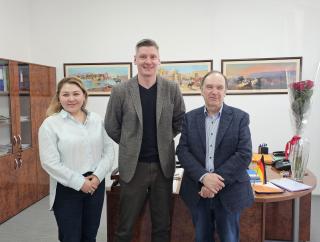
Frieden für die Ukraine
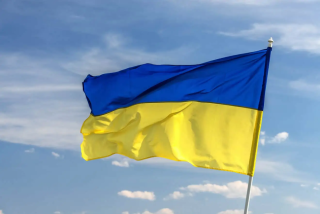
Unsere Gedanken sind bei unseren ukrainischen Kolleg*innen und Freund*innen. Auf Befehl Putins hat das russische Militär am 24. Februar 2022 ein Land im Herzen Europas angegriffen, mit dessen Wissenschaftler*innen wir vielfältige Kooperationen pflegen, in dem Freund*innen, Kolleg*innen und Familienmitglieder unserer Mitarbeiter*innen leben. Wir sind in Sorge als Menschen und alarmiert als Wissenschaftler*innen, dass massive Geschichtsklitterung als Vorwand für eine völkerrechtswidrige Invasion dient. Wir appellieren an die deutsche Öffentlichkeit, beim Blick auf das östliche Europa ihren Expert*innen und nicht Geschichtsfälschungen zuzuhören. Wir hoffen mit den Menschen in der Ukraine auf das Ende der Aggression, verbeugen uns vor ihrem Einsatz und vor den vielen Menschen in Russland und Belarus, die trotz aller Gefahren offen Kritik üben.



